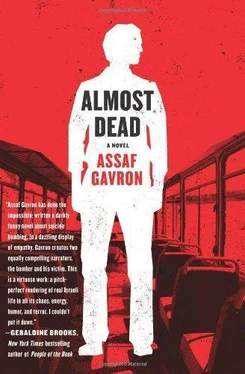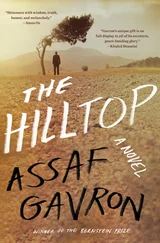Mother and Father met at Bir Zeit University, and after they got married they moved to Murair. Even in 1977 it wasn’t common for a village girl to marry a refugee with no property; or for the man to move into the house of the woman or for a father to leave land to his daughter. My mother and father didn’t care. Nor did my mother’s father. Dignity wasn’t all that important. Life was more important. But Grandfather Fahmi was more conservative. He believed refugees had to remain in the camps, even if they were crowded and uncomfortable, and he stayed in Al-Amari until he died. He said that leaving the camp would be giving up, would be accepting the situation. It would be an admission that we would never return to the homes which the Jews had stolen from us. My older brother Bilahl thinks like Grandfather Fahmi. My younger sister Lulu loves life more than an idea of dignity, like Father. I’m not quite sure whose genes I got.
Grandfather Fahmi had a horse. On Saturday afternoons I used to go to the entrance to the village and wait for him: a distant dot turning slowly into a white dust cloud moving along the horizon. Soon I’d hear the horseshoes clattering on the road, and suddenly he’d be next to me on the grey horse, extending the strongest arm I have ever known and picking me up, and we’d ride home together, me hugging his broad back and breathing in the dust and the sweet sweat, both his and the horse’s. Once we were home he’d wash his face and go out to the terrace to drink the coffee that Mother made for him. From inside the house I’d listen to his laughter and smile.
Grandfather Fahmi died ten years ago. Mother died last year. Bilahl moved from Murair to Ramallah five years ago. He was eighteen, and went to study at Kuliyat al-Iman, the faith school in A-Ram — Father and Mother weren’t too thrilled about it. He lived in the student dorms for a while and then he moved to Al-Amari, where there was a room in one of our uncles’ flats, because Bilahl believed, as his grandfather had, that refugees and the sons of refugees and the grandsons of refugees should always remain in the camps. Father and Mother did not agree…I was sixteen. They looked to me; they didn’t want to lose another son to the camp. But last year I moved in with Bilahl and Uncle Jalahl. I promised Father I would start studying in Bir Zeit University. I told him that I was just saving on the rent, that I wasn’t in the camp as my brother was, for ideological reasons. That’s not what I told my brother. I didn’t really know what I thought, in my heart of hearts.
Bir Zeit is still waiting for me…
Someone switches the music off.
‘ How is he doing? ’
Faint voices. It’s my father. I can smell his familiar old smoky smell. But why is he whispering?
‘ Hello, son. How are you feeling today? ’
Not now, come on, I’m trying to remember something. Maybe you could come back tomorrow? Because I’m not here anyway. I’m floating in the sea. The stars are out and I can see the beach, but I can’t…
The army erected a dirt ramp around Murair and blocked the entrance to the village. No explanations. The water tankers from Ramallah couldn’t get through to fill the main well, and cars couldn’t leave the village to go to the second well, on the other side of the ramp. The well dried up. Before it dried up, the water at its bottom got dirty. A virus developed in it. Many people from the village were infected by it, but they recovered. Mother did not. The doctor said she needed clean water to flush out her system and to compensate for all the liquid she was losing through sweat and diarrhoea.
Bilahl and I travelled to the village through the mountains, bypassing all the roadblocks, but it wasn’t enough. You could only get over the ramp on foot, and how much water could you carry on foot? Lulu was with her all the time, and Mother’s sisters, holding her hand and praying. But everybody was thirsty and the water we’d brought was finished immediately. I told the soldiers guarding the entrance to the village that my mother was dying and she needed water. They tried to contact their commanders. Time passed, and they got no response. They told us to stop nagging them and go home. An hour later they’d still not received an answer—‘It’s Saturday, there’s nobody to talk to.’ ‘My mother’s dying, why do you need to talk to someone? She needs water.’ ‘It’s very complicated. There are roadblocks on the way. It’s not in our power to authorise a trip.’ ‘Who has the power?’ ‘We don’t know. We’re trying to get hold of our commander to ask.’ One of the soldiers gave me a bottle of water. The next morning I asked if we could take Mother to hospital. She was in a bad way. The soldiers were angry, told us we weren’t the only ones, everybody was thirsty. The soldiers were talking on their mobiles and shouting at villagers who were begging them for help. They shot out the tyres of a tractor and arrested the driver.
The soldier who had given me water the previous day did not remember me.
‘What d’you want from me? I’m on the phone to headquarters at my own personal expense! I’m trying to find out what happened to the tanker, OK? I know you’re thirsty. I know you want water. We’re trying to sort it out and whining at us isn’t going to help the situation. So go home and a tanker will come and fill up the…Hello!’ he shouted into his phone. But I wasn’t asking for water by that stage; I was asking for an ambulance.
‘ All these troubles, my son. They’re all standing outside. Shouting. “The Croc, the Croc…” Something about the Croc. “Switch the machines off!” What have you done? Do you want me to have a heart attack? ’
What are they saying about the Croc? I know him.
Where was I? You interrupted right in the middle of…I was right in the middle of something, Father. Come on…
An ambulance arrived to take Mother away. Lulu and I got into the ambulance but at the entrance to the village they told us to get out. Only the driver, the paramedics and the patient could stay. Mother said it would be all right. She was on a drip and feeling much better. We hugged her and she blessed us, but when the ambulance started moving I broke down and cried uncontrollably, unstoppably, for minutes, while Lulu tried to soothe me. She was only thirteen and I was over twenty, but it was me who was crying and her doing the comforting. The soldiers, still on their mobiles, stared at us. The ramp that encircled the village lay like a ligature of dirt across the yellow fields. Mother died in hospital. She was forty-two. A week later they got rid of the ramp.
Jimmy Rafael in the meeting room. Five foot four of solid muscle. His shaved dome gleaming as if it had been massaged with olive oil. Maybe he did massage it with olive oil.
‘Morning, everyone! I don’t need to tell you we have no extra time so let’s get right to the point. I’ve known Dmitry for many years; we’ve shared a few important seconds in the Time Management Unit in the air force and in time engineering studies in the US. He’s going to talk about what he’s doing. About how saving a couple of seconds can change everything.’ I glanced at Ron. His eyes were making no comment, but to me they were saying, ‘Jimmy’s time talks: what a waste of time…’ I smiled to myself.
‘I am a certified time engineer and a senior traffic-light technician,’ Dmitry began. He was very tall and was wearing a cheesecloth shirt of the kind you never saw at Time’s Arrow. ‘I work for a private consulting firm in Hadera. My role is to find dead seconds. This story is about how I have found seven superfluous seconds in Rabin Square.
‘I don’t need to describe the spot: a square surrounded by four roads from two to four lanes wide. Between one and four thousand cars use the square pretty much every hour of the day. My goal was to leave it as empty as possible, and specifically to relieve a permanent congestion at the corner of Ibn-Gvirol and Zeitlin streets.’
Читать дальше












